I'm replacing a radiator in my bathroom with a towel radiator, which will also need new radiator valves. I'm hoping to do this without draining the system. I have a system boiler (boiler and hot water tank) and a closed/ unvented heating circuit. Am I right that if the valve is removed, then the system should create a vacuum and water loss will be minimal? Should I also release the pressure in the red expansion vessel before removing each valve?
Other than a few buckets and being close to the bath, are there any other tips?
Other than a few buckets and being close to the bath, are there any other tips?




